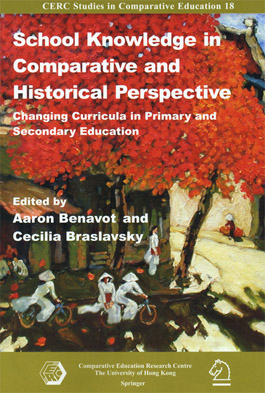CERC Studies in Comparative Education, No.18
School Knowledge in Comparative and Historical Perspective
Changing Curricula in Primary and Secondary Education
Edited by Aaron Benavot and Cecilia Braslavsky

Click here to download the flyer of the book
Click here for the Spanish edition published by Granica
ISBN 10: 962-8093-52-5; ISBN 13: 978-962-8093-52-6. (2006, 315pp.)
HK$200 (local), US$32 (overseas) [refer here for order details]
published by Comparative Education Research Centre (CERC) and Springer
School curricula are established not only to prepare young people for a real world, but also to beckon an imagined one anchored in individual rights and collective progress. Both worlds—the real and the imagined—increasingly reflect influential trans-national forces.
In this special edited volume, scholars with diverse backgrounds and conceptual frameworks explore how economic, political, social and ideological forces impact on school curricula over time and place. In providing regional and global perspectives on curricular policies, practices and reforms, the authors move beyond the conventional notion that school contents reflect principally national priorities and subject-based interests. Some authors emphasize a convergence to standardized global curricular structures and discourses. Others suggest that changes regarding the intended contents of primary and secondary school curricula reveal regional or trans-cultural influences. Overall, these comparative and historical studies demonstrate that the dynamics of curriculum-making and curricular reform are increasingly forged within wider regional, cross-regional and global contexts.
Aaron Benavot is a senior policy analyst at UNESCO (Paris) working on the Global Monitoring Report on Education For All, and a senior lecturer (on leave) from the Hebrew University of Jerusalem in Israel. His research focuses on the effects of education on development and democratization, the expansion of mass education, and worldwide patterns of official school curricula.
Cecilia Braslavsky was Director of UNESCO’s International Bureau of Education (IBE) from July 2000 until her untimely passing on 1 June 2005. A remarkable educationalist in the realms of both theory and practice, she made significant contributions to the field of curriculum development and change. She was formerly Educational Coordinator of the Latin American Faculty of Social Sciences (FLACSO), and Director-General of Educational Research in the Argentine Ministry of Education.
Click
********************************
Contents |
|
|
|
|
|
Dedication (Juan Carlos TEDESCO) |
|
|
|
|
|
Introduction (Aaron BENAVOT and Nhung TRUONG) |
|
|
|
|
|
THE CHANGING IDEOLOGICAL BASES OF THE SCHOOL CURRICULUM |
|
|
|
|
|
1 |
Educational Ideology and the School Curriculum (Robert FIALA) |
|
|
|
|
2 |
The Worldwide Rise of Human Rights Education (Francisco O. RAMÍREZ, David SUÁREZ and John W. MEYER) |
|
|
|
|
CURRICULAR CONTENTS AND PRACTICES IN PRIMARY AND SECONDARY EDUCATION |
|
|
|
|
|
3 |
The Spread of English Language Instruction in the Primary School (Yun-Kyung CHA) |
|
|
|
|
4 |
Educating Future Citizens in Europe and Asia (Yasemin Nuhoğlu SOYSAL and Suk-Ying WONG) |
|
|
|
|
5 |
Historical Competence as a Key to Promote Democracy (Cecilia BRASLAVSKY, Carla BORGES,Marcelo SOUTO SIMÃO and Nhung TRUONG) |
|
|
|
|
6 |
The Marginalization of Aesthetic Education in the School Curriculum (Jürgen OELKERS and Sabina LARCHER KLEE) |
|
|
|
|
7 |
Transmission of Values in Muslim Countries: Religious Education and Moral Development in School Curricula (Rukhsana ZIA) |
|
|
|
|
8 |
World Models of Secondary Education, 1960-2000 (David H. KAMENS and Aaron BENAVOT) |
|
|
|
|
9 |
Micro-Politics and the Examination of Curricular Practices: The Case of School Notebooks (Silvina GVIRTZ) |
|
|
|
|
THE DYNAMICS OF CURRICULUM-MAKING AND CURRICULAR REFORM |
|
|
|
|
|
10 |
The Current Discourse on Curriculum Change: A Comparative Analysis of National Reports on Education (Moritz ROSENMUND) |
|
|
|
|
11 |
The Dynamics of Curriculum Design and Development: Scenarios for Curriculum Evolution (Juan Manuel MORENO) |
|
|
|
|
12 |
Socio-historical Processes of Curriculum Change (Ivor Goodson) |
|
|
|
|
13 |
New Proposals for Upper Secondary Curricula in Four Latin American Countries, 1990-2005 (María de IBARROLA) |
|
|
|
|
SCHOOL CURRICULA IN PERSPECTIVE: REFLECTIONS ON THE PAST, AND DIRECTIONS FOR THE FUTURE |
|
|
|
|
|
14 |
Cecilia Braslavsky and the Curriculum: Reflections on a Lifelong Journey in Search of Quality Education for All (Cristián COX) |
|
|
|
|
15 |
World Models, National Curricula, and the Centrality of the Individual (John W. MEYER) |
********************************
Click here for order details

